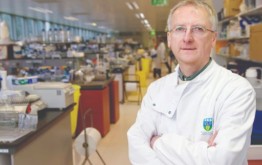IT HAS BEEN 16 YEARS since the Human Genome Project concluded – an unprecedented international research effort to identify and map all the genes that make up our DNA. The work heralded a new era, the birth of a new science known today as Precision Medicine, and it is changing the fundamental paradigm at the heart of disease diagnostics and treatment.
BREAKING GROUND

UCD researchers have been at the centre of this new science throughout its development. Once the genome was sequenced, scientists needed a way to effectively manage all the data sequencing produced. Enter Professor Des Higgins of UCD School of Medicine and the UCD Conway Institute, one of the world’s leading experts in bioinformatics, who developed a groundbreaking programme for aligning the sequences and making sense of the data. This software was the subject of his 1994 paper in the international scientific journal Nature – just four years after the Human Genome Project began. This paper went on to become, to this day, one of the top ten most cited research publications of all time, and is also cited in patents for over 27,000 products produced by organisations including Pfizer, Bristol- Myers Squibb Company, and the United States’ government.

Leading Precision Medicine at UCD today is Professor Walter Kolch, who joined the University ten years ago along with Professor Boris Kholodenko to establish Systems Biology Ireland (SBI). Kolch, an Austrian medic turned biochemist, and Kholodenko, a Russian physicist, combined their skills to build dynamic models of the human system. Attracting researchers from all over the world, SBI soon became a recognised leader in the Precision Medicine field. It was one of the first groups to model not only the impact of your DNA but also the impact of your environment, lifestyle and nutrition on how you treat disease.
As SBI reaches its ten-year anniversary at UCD, they can look back with pride at what they, and UCD, have achieved. Kolch is now number two* in the world in the area of precision oncology (precision medicine applied to cancer), while Kholodenko is number one* in the world in computational and mathematical modelling. Having proven their work in the lab, they want to make an impact on the lives of Irish patients.
Explaining it all, Professor Kolch said: “We are all different and we all react differently. The flu will affect each of us differently and so too will the treatment. It was 2,500 years ago when Hippocrates said, ‘It is far more important to know what person the disease has than what disease the person has’. In the genomics age of technology we now have the means to treat the person, not the disease.”
*In total citation Google Scholar
THE COST OF IMPRECISION
At its core, Precision Medicine uses data about a person’s genes (genomics), as well as environmental factors such as lifestyle and nutrition (the other ‘omics’ such as metabolomics and proteomics), to understand the unique pathways of a disease or drugs in that person. With this information doctors can then prescribe the right treatment in a timely fashion, saving the wasted resources and time our current “trial and error” methodology incurs, while greatly improving response rates.
“For the top ten best-selling drugs in medicine today, the response rate is only between four and 24 per cent of patients. That’s not because the drugs are badly designed, it’s because we are all different and they affect us differently. A lot of patients don’t have the luxury of time for a trial and error approach, and it is very expensive,” Professor Kolch explained.
But with a diagnosis founded on integrated ‘omic’ data from a patient, the results are substantially better – in one example increasing survival rates for lung cancers from ten to 60 per cent.
UCD Professor of Paediatric and Adolescent Medicine and Consultant Paediatric Haematologist at Our Lady’s Children’s Hospital, Crumlin, Professor Owen Smith pointed to the benefits of Precision Medicine over conventional medicine in treating childhood cancers – a specialist area that sees higher cure rates than in adult cancers but sees greater rates of secondary cancer and other problems continuing into adulthood.
“To paraphrase Bill Clinton, it’s the mutation, stupid. We need to know how to kill what’s causing the cancer and not harm the rest of the body along with it. Targeting the pathways with Precision Medicine would enable doctors and drugs manufacturers to treat childhood cancers more effectively without the ‘friendly fire’ of toxicity caused by cancer drugs.” In addition to causing secondary cancers in children, this toxicity in their bodies can lead to deafness, infections and chronic health issues, causing economic and social problems long into the future.
Looking at a different area of health, Conway Fellow and head of the metabolomics research group at the UCD Institute of Food and Health, Professor Lorraine Brennan cites another of the overwhelming challenges facing us today – obesity – and how a precision approach could better serve people. “At the moment, first line obesity management is weight loss through a combination of dietary and physical activity behaviour changes. Unfortunately, this ‘one size fits all’ approach doesn’t work for most people.”
The inter-relationships between environmental, biological and social determinants of obesity are complex. Patients can be described as metabolically healthy obese or metabolically unhealthy obese, with the latter having obesity-related metabolic complications and both groups exhibiting different responses to different therapeutic approaches. According to Professor Brennan: “A more personalised approach that considers obese individuals according to their type may be more advantageous for the individual and have implications in terms of developing more tailored obesity treatments.”
Furthermore, having access to ‘omics’ data on individuals would help clinicians expand on research into personalised nutrition based on genetic make-up, with many potential benefits for a person’s health and wellness beyond treating diseases.
PARTNERSHIP IS KEY
In March this year, UCD announced a partnership with Genomics Medicine Ireland (GMI), a recently formed company that will create 600 new jobs taking advantage of this emerging field of science. The genomics research collaboration between UCD and GMI will look at diseases such as multiple sclerosis, diabetes, inflammatory bowel disease and Alzheimer’s and seek to understand the genetic basis of these diseases.
The research can be used by pharma companies to produce medicines that deliver better, more targeted treatment, and in time will also be used by doctors and clinicians to improve diagnostics and streamline screening for genetic diseases. Public-private partnerships such as this will be part of the solution to bring the benefits of this breakthrough science to Irish patients.
SO, WHAT’S NEXT?
Opportunities and challenges remain for Kolch, Kholodenko and the team, to bring Precision Medicine to its full potential. “The bottleneck today is generating the computational models we need to interpret the data. Then we can make a full digital simulation of a person – your ‘digital twin’ – and doctors can analyse and optimise and then provide the best therapeutic plan first time around.” This is what UCD’s Systems Biology Ireland will be concerned with from now on – to gain for the first time a fully holistic view of the patient, to achieve better health for all in the future.

